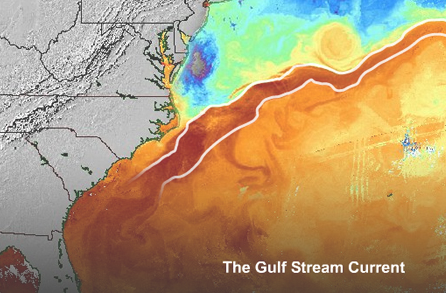A new study confirmed that the Gulf Stream is definitely weakening, with implications for weather systems in the U.S. and Europe.
In the new study, scientists from the Woods Hole Oceanographic Institution and the University of Miami examined data measuring the volume of seawater carried through the Florida Straits for 40 years.
Their conclusion: The amount of water has decreased by 4 percent. They say their findings represent the first “conclusive, unambiguous observational evidence” of a slower Gulf Stream. They say there’s a 99 percent chance that the slowing was not a random event.
Chris Piecuch, a scientist from Woods Hole, says, “While we can definitely say this weakening is happening, we are unable to say to what extent it is related to climate change or whether it is a natural variation.”
The Gulf Stream flows from the Gulf of Mexico around Florida and then up the east coast of the U.S., breaking east off Cape Hatteras and going all the way up to the North Atlantic before heading south again, acting like a giant conveyer belt. It carries warmer water up the coast, influencing weather patterns, temperatures, rainfall, sea level and hurricane activity.
“The Gulf Stream is a vital artery of the ocean’s circulation,” said Lisa Beal, an oceanographer from the University of Miami, “and so the ramifications of its weakening are global.”
The new study was published in Geophysical Research Letters.
Read more: https://agupubs.onlinelibrary.wiley.com/doi/10.1029/2023GL105170




